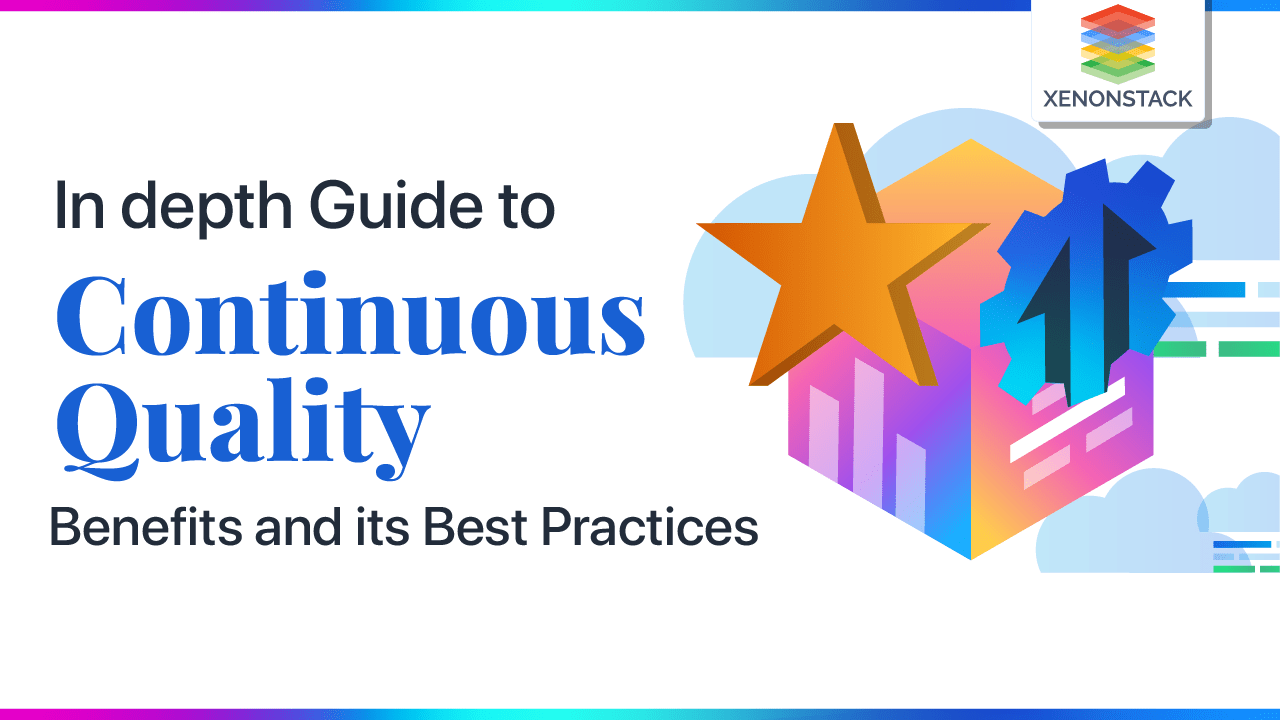
What is Continuous Quality?
It is a quality assurance approach that involves continuous monitoring and improving the quality of a product or service throughout its development and delivery. The goal of continuous quality is to identify and fix quality issues as they arise rather than waiting until the end of the development process to perform quality testing. This approach can help ensure that the product or service meets the required standards and specifications and meets the needs of its users.
Several critical practices can help organizations implement continuous quality:
- Continuous integration: This involves frequently integrating new code into the main codebase, typically several times a day. This allows for the early detection of problems and lets developers fix them quickly.
- Continuous testing: This involves running automated tests continuously throughout the development process to identify and fix issues as they arise.
- Continuous deployment: It involves deploying code changes to production systems as soon as they pass testing rather than waiting for a scheduled release. This allows organizations to deliver new features and improvements to users more quickly.
- Continuous feedback: It involves seeking and incorporating feedback from users and other stakeholders throughout the development process. This can help identify quality issues and guide improvements to the product or service.
By implementing these practices, organizations can improve the quality of their products or services and increase customer satisfaction.
Software quality management activities are generally divided up into three core components: quality assurance, quality planning, and quality control. Click to explore about our, Software Quality Management
Why do we need it?
It involves regularly reviewing processes and systems to identify areas for improvement. Implementing changes to address those issues. Continuously monitoring the results to ensure that the desired improvements are being achieved.
There are several reasons why continuous quality is essential:
- Continuous improvement: By continuously monitoring and improving the quality of a product or service, organizations can continuously improve their operations and better meet the needs of their customers.
- Increased customer satisfaction: Customers expect high-quality products and services, and its efforts help organizations meet and exceed those expectations, leading to increased customer satisfaction.
- Increased competitiveness: Organizations must deliver high-quality products and services to remain competitive in today's global marketplace. Continuous quality efforts can help organizations maintain a competitive edge by meeting their customers' ever-evolving expectations.
- Increased efficiency: Its efforts can help organizations identify and eliminate waste and inefficiencies in their processes, leading to increased efficiency and productivity.
- Improved financial performance: By continuously improving the quality of their products and services, organizations can increase customer satisfaction, reduce costs associated with defective products, and improve their financial performance.
DevSecOps is all about introducing security in the earlier phase of the application or software development cycle and continuous integration. Click to explore about our, DevSecOps Tools and Continuous
What are the benefits of Continuous Quality?
It has several benefits for organizations, including:
- Increased customer satisfaction: By continuously monitoring and improving the quality of their products and services, organizations can better meet the needs and expectations of their customers, leading to increased satisfaction.
- Increased competitiveness: Its efforts can help organizations maintain a competitive edge by ensuring they can meet their customer's evolving needs and expectations.
- Increased efficiency: Organizations can increase efficiency and productivity by identifying and eliminating waste and inefficiencies in their processes.
- Improved reputation: Organizations that are known for their commitment to continuous quality often have a strong reputation in their Industry, which can lead to increased customer loyalty and new business opportunities.
- Enhanced team member satisfaction: By continuously improving processes and systems, organizations can create a more positive and efficient work environment, leading to increased team member satisfaction and retention.
Enable Cloud Native Applications Development with DevOps Best Practices for collaboration, version control, automated testing and compliance. Click to explore about our, Continuous Delivery Solutions with GitOps
Which industry should prioritize their adoption?
It can be beneficial for organizations in any industry. Some examples of industries that may particularly benefit from adopting continuous quality practices include:
- Manufacturing: Continuous quality can help manufacturers improve the quality of their products, reduce defects, and improve efficiency.
- Healthcare: Its efforts can help healthcare organizations improve patient safety, reduce errors, and increase the effectiveness of treatments.
- Service industries: Organizations that provide services, such as hotels, restaurants, and banks, can use it to improve the customer experience and increase customer satisfaction.
- Technology: The fast-paced nature of the technology industry means that continuous quality efforts can help organizations stay ahead of the competition by continuously improving their products and services.
- Retail: Retail organizations can use it to improve the quality of their products, increase customer satisfaction, and reduce returns and complaints.
An approach which consolidates test first driven methodology and refactoring. Click to explore about our, Golang Unit Testing
What are its best practices?
There are several best practices for implementing continuous quality in an organization:
- Establish a clear quality vision and goals: It is essential to have a clear understanding of what quality means for your organization and to set specific, measurable, achievable, relevant, and time-bound (SMART) goals for quality improvement.
- Involve all employees: It is a company-wide effort, so it is essential to involve employees at all levels in the process. This can help ensure that everyone is aware of the importance of quality and is committed to continuously improving it.
- Use data and metrics to drive improvement: Collect and analyze data on key quality indicators to identify areas for improvement and measure the success of quality improvement efforts.
- Continuously review and improve processes: Regularly review processes to identify areas for improvement and implement changes to address those issues.
- Promote continuous learning and improvement culture: Encourage employees to learn and continually seek opportunities for improvement.
- Emphasize prevention over correction: Focus on preventing problems instead of resolving the issues that come to the surface.
- Collaborate with customers, suppliers, and other stakeholders: Engage with customers and other stakeholders to understand their needs and expectations and work with suppliers to ensure that they meet those requirements.
- Use tools and techniques like Six Sigma and Lean: These methodologies can help organizations identify and eliminate waste and inefficiencies in their processes and improve the quality of their products and services.

Conclusion
Any organization that values customer satisfaction, efficiency, and competitiveness can benefit from continuous quality practices.
- Discover here about Test Driven Development for Java
- Get deep insight about Software Testing Best Practices
.webp?width=1921&height=622&name=usecase-banner%20(1).webp)


